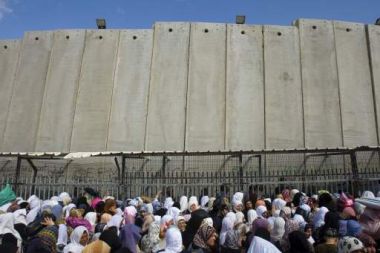Fears of eviction for 58 Christian families living in path of Israel's security wall

There has been outcry among Catholic bishops over the threatened eviction of 58 Palestinian Christian families because of Israel's plans to extend the security wall.
The group of bishops, known as the Holy Land Co-ordination, includes three from England and Wales.
They recently met with families from the Beit Jala region of the Cremisan Valley to gain a better understanding of the situation.
In a statement, they said "We heard of their pain and anguish. They are faced with the threatened loss of their land and livelihood as the planned security wall will destroy vineyards, groves and orchards and separate them from their land."
The bishops fully affirmed the right of Israel to exist and defend itself from attack, but voiced strong objections to the planned route of the security wall beyond the Green Line, the internationally-recognised demarcation line separating Israel and the territories captured in the six-day war of 1967.
"More than three quarters of the wall's planned route falls outside the Green Line and is illegal according to a landmark advisory opinion of the International Court of Justice, while also a flagrant breach of the Geneva Convention and the Universal Declaration of Human Rights," the bishops said.
Calling on the international community to put pressure on Israel, the bishops said: "We urge our governments to encourage Israel to follow international law. In particular, for Israel to respect the livelihoods of these families and for the people of Beit Jala to be protected from further expropriation of their land and homes by Israel."
Questioning Israel's motives, the bishops warned that if Israel is goes ahead with the plans, the result will be to strain relations with Palestine even further.
"Our deep concern, as we have repeatedly stated is that this planned security wall is more about consolidating the settlement areas and permanently choking off Bethlehem from Jerusalem," they said.
"This particular plan is a microcosm of the tragic situation in the Holy Land which incites resentment and mistrust, making the possibility of a much-needed solution less likely."
The Cremisan Valley region sits on the border between the municipal authority of Jerusalem and the West Bank, and the local Byzantine Christian monastery is one of the places affected, with the monastery's main building lying inside Jerusalem, while its car park and store rooms are in the West Bank.
Since the beginning of the construction of the security wall, or "fence" as it is often called by Israel, attacks by Palestinians against Israel have decreased.
Israel argues that the security wall is necessary to stop attacks on civilians. In 2002 when the wall's construction began there were 55 Palestinian suicide bombings in Israel. In 2007, that number had dropped to one.
Many Palestinians feel that the wall is being used to seize more territory, and complain that the restriction on movement has affected trade and employment for the local population.
Yesterday, the Israeli Supreme Court began hearing pleas from the Christians in the Beit Jala region that they be allowed to keep their land.
The Holy Land Co-ordination said: "Our prayers are with the people of Beit Jala as they seek justice. We offer them also for all who seek a just peace in the Holy Land."











